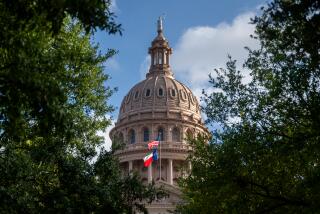Kerry Says Rice Should Testify Publicly on 9/11
Entering the fray over the Bush administration’s anti-terrorism efforts, Democratic presidential candidate John F. Kerry on Saturday called on national security advisor Condoleezza Rice to testify publicly before the independent commission investigating the Sept. 11 attacks.
“Condoleezza Rice can find time to do ’60 Minutes’ on television before the American people,” Kerry said in a meeting with reporters here. “She ought to find 60 minutes to speak to the commission under oath. We are talking about the security of our country.”
The Massachusetts senator said Rice should address the panel, just like other administration members, including Secretary of State Colin L. Powell.
The committee’s activities came to the center of presidential politics last week when former anti-terrorism czar Richard Clarke said he and others working for President Bush should have done more to head off the Sept. 11 assaults on the Pentagon and the World Trade Center.
Citing executive privilege, Rice has said she will not testify publicly. She has offered to meet with the committee of five Democrats and five Republicans behind closed doors.
Kerry rejected the idea of secret testimony. “Certainly we can find a way to respect executive privilege, not to have it be an opening of the door, but nevertheless accomplish America’s needs to protect the security of our country,” Kerry said, as Missouri Rep. Dick Gephardt, a former rival for the Democratic presidential nomination, stood by his side.
Nicolle Devenish, communications director for Bush’s reelection campaign, issued a statement calling Kerry’s comments an “attack” on Rice and “part of the Democrats’ strategy to politicize the work of the 9/11 commission.”
“John Kerry seeks to distract Americans from his own failed ideas for protecting America from future attacks,” Devenish went on. “John Kerry’s backward-looking approach would return us to the failed policies of treating terror as a law enforcement matter.”
But Kerry declined reporters’ requests that he comment on Rice and Clarke. He said he wanted to give the committee a chance to do its work without interference. He suggested the White House should take the same approach, charging that, instead, the administration had engaged in a pattern of vilifying former insiders, like Clarke, who criticized the administration’s performance.
Kerry cited two other officials he said had been subject to the attacks: former Treasury Secretary Paul O’Neill, who said Bush was a disengaged chief executive who was bent on war with Iraq, and Richard S. Foster, a Medicare analyst who said the administration underestimated the costs of its Medicare reforms.
Kerry said Bush’s reluctance to cooperate with the 9/11 commission compared poorly to the presidential response after the last momentous attack on the United States.
“After Pearl Harbor, Franklin Roosevelt ... didn’t need to be prodded to start an investigation to see what happened,” Kerry said. “He wanted to know how we were going to protect America and win a war. This administration has done the opposite and stonewalled the commission.”
Kerry arrived in Missouri about midday Saturday after a day of campaigning in Michigan.
He visited a training center for apprentice carpenters in Kansas City, where he sat behind a makeshift plywood workbench and talked to men and women who said they were out of work or fearful for their jobs.
Electrician Reggie Marselus told Kerry that he had not been able to find regular work for eight months and was worried that his health insurance benefits would lapse.
The 50-year-old said he had seen such hard times before under other Republican presidents, and was concerned enough that he had sent money from his unemployment check to Kerry’s campaign.
Kerry reiterated his plan to levy higher taxes on American companies that shift jobs overseas and to give tax credits to firms that create new jobs or provide healthcare to employees.
Kerry later flew to St. Louis, where he told a crowd of 1,200 at an outdoor pavilion that the gap between rich and poor in America was growing ever wider. He pledged to roll back Bush’s tax cuts for those making more than $200,000 a year.
The crowd interrupted the candidate several times, chanting his name and shouting “Gephardt VP” -- an expression of local hopes that their native son will be chosen by Kerry as the party’s vice presidential nominee. Gephardt, sitting on a stool on the stage, smiled.
Today, Kerry is flying to California for fundraisers and rallies in Sacramento, San Francisco, San Diego and Los Angeles.
More to Read
Get the L.A. Times Politics newsletter
Deeply reported insights into legislation, politics and policy from Sacramento, Washington and beyond. In your inbox three times per week.
You may occasionally receive promotional content from the Los Angeles Times.







